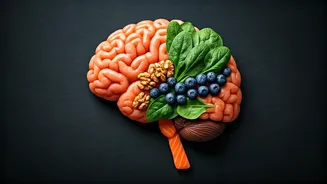Challenge Your Brain
Regular mental workouts are essential for a healthy brain. Engaging in activities that challenge your cognitive abilities can keep your mind sharp and
prevent cognitive decline. Consider incorporating puzzles like crosswords and Sudoku, which are excellent for improving memory and problem-solving skills. Learning a new language is another fantastic option, as it forces your brain to create new neural pathways, enhancing overall cognitive function. Reading regularly is also beneficial; it exposes you to new ideas and perspectives, keeping your mind active and engaged. These activities help stimulate different areas of the brain, promoting its overall health and resilience. Consistent mental challenges ensure your mind stays agile and responsive to new information, making it easier to learn and adapt throughout life.
Nourish with Food
The food you consume plays a critical role in brain health. Eating brain-healthy foods provides essential nutrients that support cognitive function and protect the brain from damage. Incorporate foods rich in antioxidants, such as berries and leafy green vegetables, into your diet to combat free radicals that can harm brain cells. Include omega-3 fatty acids from sources like fish and flaxseed, which are crucial for brain structure and function. Incorporating nuts and seeds provides a good source of healthy fats and vitamins that support cognitive performance. Ensure a balanced diet that includes a variety of fruits, vegetables, and whole grains to provide a range of nutrients that are essential for optimal brain health. Making informed food choices can significantly improve your brain's ability to function and thrive.
Prioritize Quality Sleep
Adequate sleep is vital for brain health and overall well-being. During sleep, your brain consolidates memories, clears out toxins, and repairs itself. Aim for 7-8 hours of quality sleep each night to ensure optimal cognitive function. Establish a regular sleep schedule by going to bed and waking up around the same time daily, even on weekends, to regulate your body's natural sleep-wake cycle. Create a relaxing bedtime routine, such as taking a warm bath, reading a book, or listening to calming music, to help you unwind and prepare for sleep. Ensure your bedroom is dark, quiet, and cool, as these conditions promote better sleep quality. Avoiding caffeine and alcohol before bed can also improve your sleep. Prioritizing sleep is a simple yet powerful habit that can have a significant positive impact on your cognitive abilities and overall health.
Regular Exercise Benefits
Physical activity enhances blood flow to the brain, providing essential oxygen and nutrients that support cognitive function. Engaging in regular exercise promotes the growth of new brain cells and strengthens existing neural connections. Incorporate moderate-intensity exercises like brisk walking, jogging, or cycling for at least 30 minutes most days of the week. Activities like yoga and tai chi can also improve cognitive function by enhancing balance, coordination, and mental focus. If you find it challenging to fit exercise into your daily routine, consider breaking it up into shorter sessions throughout the day. For example, you could do a short burst of exercise during your office hours. Consistency is key when it comes to reaping the cognitive benefits of exercise, so try to make it a regular habit. Including exercise in your routine is a proactive way to maintain a sharp mind.
Socially Connect Daily
Staying socially connected is critical for cognitive health and preventing cognitive decline. Engaging in social interactions stimulates the brain, keeping it active and responsive. Make time for conversations with friends and family, either in person, via phone, or through video calls, to maintain meaningful connections. Participate in group activities, such as joining a club or volunteering, to interact with others and expand your social network. Social engagement can also reduce stress and improve your overall mood, contributing to a healthier brain. When interacting with others, make an effort to listen actively and participate in conversations; this mental engagement will further boost cognitive function. Prioritizing social interactions contributes significantly to a healthy brain by keeping your mind engaged and preventing feelings of isolation.














